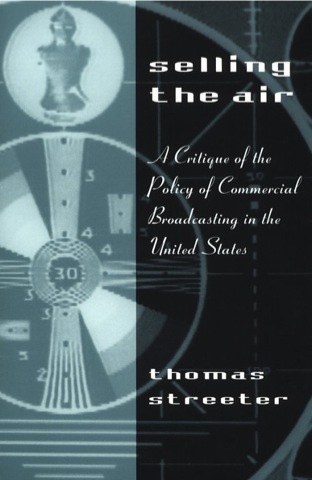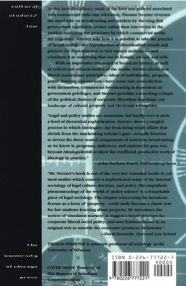This book looks at the ways that ideas have figured in the creation and maintenance of American commercial broadcasting: ideas about markets, property, communication, individuals, and society. And it reverses the usual take on broadcasting and markets by showing that government regulation creates rather than intervenes in the market. In exploring the sometimes contradictory roles ideas have played in the life of the institutions of radio and television, the book also becomes an inquiry into the ideas themselves. Its central question is not, "is it good or bad to organize electronic media on a commercial basis?" but rather, "what does it mean to organize broadcasting that way? What are the conditions that make it possible to take the practice of broadcasting -- the reproduction of disembodied sounds and pictures for dissemination to vast unseen audiences -- and constitute it as something that can be bought, owned, and sold?"

"Legal and policy studies are numerous, but hardly ever at such a level of theoretical sophistication. Streeter shows a tangled process in which ideologies -- far from being wispy affairs that shrink from the muckraking scholar's gaze -- actually function to invent the three central components of American broadcasting as we know it: programs, audiences, and stations. He goes way beyond Ideologiekritik to show the conflicted, productive work of ideology in practice."
John Durham
Peters, University of
Iowa
"Mr. Streeter's
book is one of the very few extended works in cultural
studies which conveys a sophisticated sense of the internal
sociology of legal culture, doctrine, and policy. His
empathetic phenomenology of the world of 'policy science'
is a remarkable piece of legal sociology. The chapter
concerning the broadcast license as a form of 'property,'
could easily become a classic text for law students
learning about property. He introduces the notion of
'simulated markets' to suggest a broad structure for
corporate liberal social policy, and uses feminist theory
in an original way to unsettle the consumer/producer
dichotomy."
David
Kennedy, Harvard Law
School
You can order the
book from the University of Chicago
Press, or
amazon.com. To read a
chapter from the book, click here.

Here are a few quotes from the book:
Why the broadcast industry is not a dinosaur:
Broadcasting was one of the first industries to deal largely in electronic intangibles, and certainly the first such to become part of the everyday lives of almost all Americans. The complexities involved in the social construction of broadcasting may have bearing on contemporary concerns about intellectual property, culture, and politics in the development of new communications technologies. This book suggests, moreover, that the legal and political problems facing computer communications today are much less unique and much more like those associated with broadcasting than the oft-heard euphoric rhetoric of "the information revolution" would imply. If our future social and economic systems will be increasingly characterized by the technologically-enabled commodification and exchange of intangibles, commercial broadcasting provides us with an example of one way that such commodification can be accomplished, and of the problems that are likely to be encountered if that path is taken.
On the relation of law and technology:
The tools of broadcasting, even the boxes in our living rooms, are to a large degree legal constructs. A TV set itself is made practical, made into a practice, by its internal organization in concert with the elaborate social relations that make broadcasting possible, including everything from government regulation of the spectrum to a consumer economy. Those relations, in turn, centrally involve law and politics, that is, lawyers, judges, legislators, and a polity interpreting, making, changing, and enforcing laws and regulations that enable and shape both the equipment of broadcasting and the institutions that make the equipment come alive. So a television set is not just a technology; it is a collection of tubes, wires, and microchips whose organization is determined by, or inscribed with, law; it is a legal inscription on technology.
On copyright and technology:
. . . the idea that culture emanates from the uniquely creative soul of gifted individuals. . . continues to shape both popular consciousness and legal decisionmaking. . . . Yet . . . the clearest boundaries in the program production industry arguably are no longer the legal boundaries between autonomous creators or the boundaries between various owners of copyrighted materials. The key boundaries are those that delineate the "system," the cultural and social barriers separating industry insiders from outsiders. Today, the job seeker "breaks in" to the industry as a whole, not into this or that company. Becoming a successful writer is a matter, not of establishing oneself as a unique literary figure, but of proving one's ability to conform to the needs of the system. Significantly, however, this general collectivization of cultural production is conducted, not in the name of the social over the individual, but in the name of individualism and free markets. Depersonalizing bureaucratic relations are created in the name of "personalizing" legal institutions.
On spectrum auctions:
In recent years the FCC has been moving ever farther into the brave new world of spectrum auctions, wherein channels are sold to the highest bidder instead of licensed according to the public interest. . . . conservative market purists herald this trend as a move in the direction of market principles away from government interference, while some on the left worry about the FCC's abrogation of its duties to uphold the public's interest. Yet it takes little reflection to show that both positions are somewhat beside the point; the two sides are arguing about the location of a formal boundary between private and public that does not exist. . . . Spectrum auctions will hardly remove the government's hand from electronic communications altogether, however. Technical standards, the definition of channel characteristics in spectrum allocations, the timing and mechanisms of auctions, antitrust enforcement, and other market-defining actions will continue to be determined by some combination of Congress, the courts, and the FCC. By the same token, auctions will not dramatically change the FCC's principal relation to industry, which has always been one of generalized support and protection of propertied interests in the spectrum; auctions are not an abrogation of responsibility so much as a minor adjustment of the way it is enacted. The central difference is merely that traditionally, channels were sold only by private entities; now the government is selling them too. . . . the sound and fury over auctions ignores the underlying consistency between auctions and public interest licensing: in each case, the larger goal is to use government legal powers to enable and support corporate media.
On the politics of broadcast licenses:
It is fruitless to argue about whether or not licenses should be treated more like a right or more like a privilege. Even if licenses do confer property rights, even if those rights are indistinguishable from the rights that exist for traditional commodities, and even if the resulting economic effects can be usefully analyzed in terms of transaction costs, the rights so conferred nonetheless rely on, and thus are inevitably and properly subject to, political intervention.
On the importance of intellectual property to policymaking:
It seems relatively certain at this point that, for better or worse, the "information society" will be developed largely on the basis of marketplace exchange. The buying and selling of information need not be discussed as if it were the natural outgrowth of economic or technological imperatives: the creation of commodities in information involves an elaborate act of collective imagination. Images, symbols, and creative works are not self-evidently property. The fundamentally social world of shared signs and symbols contains no obvious natural boundaries that tell us where to draw the property lines, where to put the picket fences (or whether they should be picket fences or brick walls). There is little or nothing inherent in the concepts of property and information that dictates exactly how, when, and to what extent information should be commodified. The creation of property in symbolic "goods," therefore, involves profound moral, social, and political choices. The creation of property through legal means is one of the principal ways in which social boundaries have been and continue to be drawn in the world of electronic media. Most obviously, the commodification of electronic ephemerals involves designating who owns what, and thus allocates power of the sort most fundamental to capitalism. But it also involves designating what ownership entails, what powers are created by the conditions of ownership, and thus helps shape relations between institutions, organizations, and individuals. Careers, corporations, and entire industries hinge on the shifting terms of property in electronic ephemerals. In a sense, property defines who under law "originates" an act of communication and thus determines who controls the process; it plays an integral role in constructing fundamental communicative relations. The overworked terrain of First Amendment and libel laws involve after-the-fact tinkering with existing communicators' ability to communicate, whereas property defines who is a communicator in the first place. . . . The law of ephemeral property is thus becoming a principal terrain for constructing the contours of contemporary cultures. . . . What kinds of activities will be encouraged and what kinds discouraged, which made central and which marginalized? What kinds of relations between work and home will be encouraged? Which communities will be dissolved, which formed, and which transformed? What might be the fate of Western individuality in commodified electronic regimes? of collective modes of cultural production? Are there information-age analogs to the Native American cultures that were destroyed by the imposition of European property schemes on the North American interior? Might there be electronic parallels to the Great Plains or rainforest ecosystems that have been devastated under the force of the property system? What influence might the choices made have on the character of life and culture?